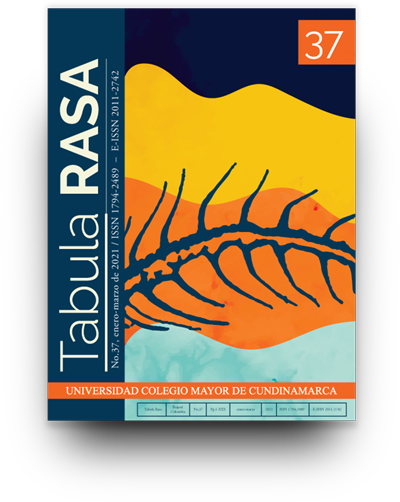El sistema-mundo más allá de 1492: modernidad, cristiandad y colonialidad, aportes para unas historias globales de/ desde el sur
The World-System Beyond 1492: Modernity, Christianity, and Coloniality: Contributions for Global Histories of/from the South
Mostrar biografía de los autores
En este artículo se propone valorar las limitaciones de la historiografía decolonial que derivan de la herencia recibida del programa de investigación desarrollado por Immanuel Wallerstein. Se trata de un ejercicio al interior de giro decolonial, un intento por ir más allá del momento de criticidad, porque los límites de los marcos categoriales justo aparecen en el momento constructivo. Aportes para unas historias globales de/desde el sur, se propone retomar las cuestiones abiertas por el primer giro decolonial, presentando el programa de las historias globales del sur como un segundo momento necesario para ir en pro de historias decoloniales de la humanidad.
Visitas del artículo 99 | Visitas PDF 82
Descargas
- Bayly, C.A. (2004). The Birth of the Modern World, 1780-1914, Oxford: Blackwell.
- Bernal, M. (2003). Black Athena, The Afroasiatic Roots of Classical Civilization: The Frabication of Ancient Greece 1785-1985. Vol I. New York: Rutgers University Press.
- Briceño Guerrero, M. (1994). El laberinto de los tres minotauros. Caracas: Monte Ávila editores.
- Ciriza, A. (2014). Utopía y revolución: los sueños de un mundo mejor en tiempos de insurgencias. En: G. Hoyos Vásquez (Ed.). La unión Latinoamericana, diversidad y política. Buenos Aires: Clacso.
- Conrad, S. (2016). What is Global History? New Jersey: Princeton University Press.
- Coronil, F. (1996). Beyond occidentalism: Toward nonimperial geohistorical categories. Cultural Anthropology, 11(1), 52-87.
- Dussel, E. (2007). Política de la liberación: historia mundial y crítica. Madrid: Trotta.
- Dussel, E. (2006). Ética de la liberación en la edad de la globalización y de la exclusión. Madrid:Editorial Trotta.
- Fabian, J. (2002). Time and the Other, how anthropology makes its object. New York: Columbia University Press..
- Federici, S. (2017). Calibán y la bruja. Mujeres, cuerpo y acumulación originaria. Madrid: Traficantes de sueños.
- Frank, A. G. (2015). ReOrienting The 19th Century: Global Economy in Continuing Asian Age. Boston: Paradigm Publisher.
- Frank, A. G. (1998). ReOrient: Global Economy in the Asian Age. Berkeley: University of California Press.
- Frank, A. G. & Gills, B. K. (Eds.). (1996). The World System, Five hundred years or five thousand? New York: Routledge.
- Frankopan, P. (2016). El corazón del mundo, una nueva historia universal. Barcelona: Crítica.
- Heng, G. (2018). The Invention of Race in the European Middle Ages. Cambridge: Cambridge University Press.
- Himkelamert, F. (2018). Totalitarismo de mercado: el mercado capitalista como ser supremo. México: Akal.
- Jin, D. (2016). The great knowledge transcendence, The Rise of Western Science and Technology Reframed. New York: Palgrave McMillan.
- Karatani, K. (2014). The structure of world history. From modes of production to modes of exchange. Durham: Duke University Press.
- Maldonado-Torres, N. (2008). Against war: views from the underside of modernity. Durham: Duke University Press.
- McKnight, S. A. (2006). The religious foundations of Francis Bacon’s thought Columbia: University of Missouri Press.
- Merchant, C. (1980). The Death of Nature: Women, Ecology and the Scientific Revolution. New York: Harper and Rope.
- Mignolo, W. (2011). The Darker Side of Western Modernity. Global futures, Decolonial Options. Durham: Duke University Press.
- Mignolo, W. (2009). Desprendimiento, la retórica de la modernidad y la lógica de la colonialidad. En: R. Grosfoguel & J. Romero Losacco (Comps.). Pensar descolonial. Caracas: Fondo Editorial La Urbana.
- Moore, R.I (2007). The Formation of a Persecuting Society. Authority and Deviance in Western Europe 950–1250. New York: Blackwell Publishing.
- Mota, A. (2015). The American Divergence, the Modern Western World and the Paradigmatisation of History. En: P. Wagner (Ed.). African, American and EuropeanTrajectories of Modernity: Past Oppression, Future Justice? (pp. 21-41). Edinburgh: Edinburgh University Press.
- Mota, A. (2014). La transformación del Estado: el rol de América Latina en la construcción de la modernidad. En: G. Hoyos Vásquez (Ed.). La unión latinoamericana, diversidad y política. Buenos Aires: Clacso.
- Muchembled, R. (2002). Historia del diablo, siglos XII-XX. México: Fondo de Cultura Económica.
- Murphy, C. (2012). God’s jury: The Inquisition and the making of the modern world. Boston: Houghton Mifflin Harcourt Publishing.
- Pomeranz, K. (2000). The Great Divergence: China, Europe, and the making of the modern world economy. New Jersey: Princeton University Press.
- Raju, C.K (31 March 2019). Do Indians have a scientific temper? Ancient texts reveal we did, way before the West. The Print. https://theprint.in/opinion/do-indians-have-ascientific-temper-ancient-texts-reveal-we-did-way-before-the-west/214767/
- Raju, C.K. (2012). Euclid and Jesus. How and why the church changed mathematics and Christianity across two religions war. Penang: Multiversity and Citizens International.
- Robinson, C. (2000). Black Marxism, the making of the black radical tradition. Chapel Hill: The University of North Carolina Press.
- Rosenthal, J. L. & Wong, R. B. (2011). Before and Beyond Divergence: The Politics of Economic Chance in China and Europa. Cambridge: Harvard University Press.
- Sibai, S. A. (2016). La cárcel del feminismo, hacia un pensamiento islámico decolonial. Madrid: Akal.
- Thompson, W. (2000). The emergence of political economy. London: Routledge.
- Vries, P. (2010). The California School and Beyond: How to Study the Great Divergence? History Compass, 8/7, 730-751. https://doi.org/10.1111/j.1478-0542.2010.00698.x
- Wallerstein, I. (2011). The Modern World-System IV. Centrist Liberalism Triumphant, 1789-1914. Berkeley: California University Press.
- Wallerstein, I. (2006). Capitalismo Histórico. México: Siglo XXI.
- Wallerstein, I. (2005). El moderno sistema mundial: agricultura capitalista y los orígenes de la economía-mundo europea en el siglo XVI. México: Siglo XXI.
- Wallerstein, I. (2004). El moderno sistema mundial: la segunda era de gran expansión de la economía-mundo capitalista, 1730-1850. México: Siglo XXI.




